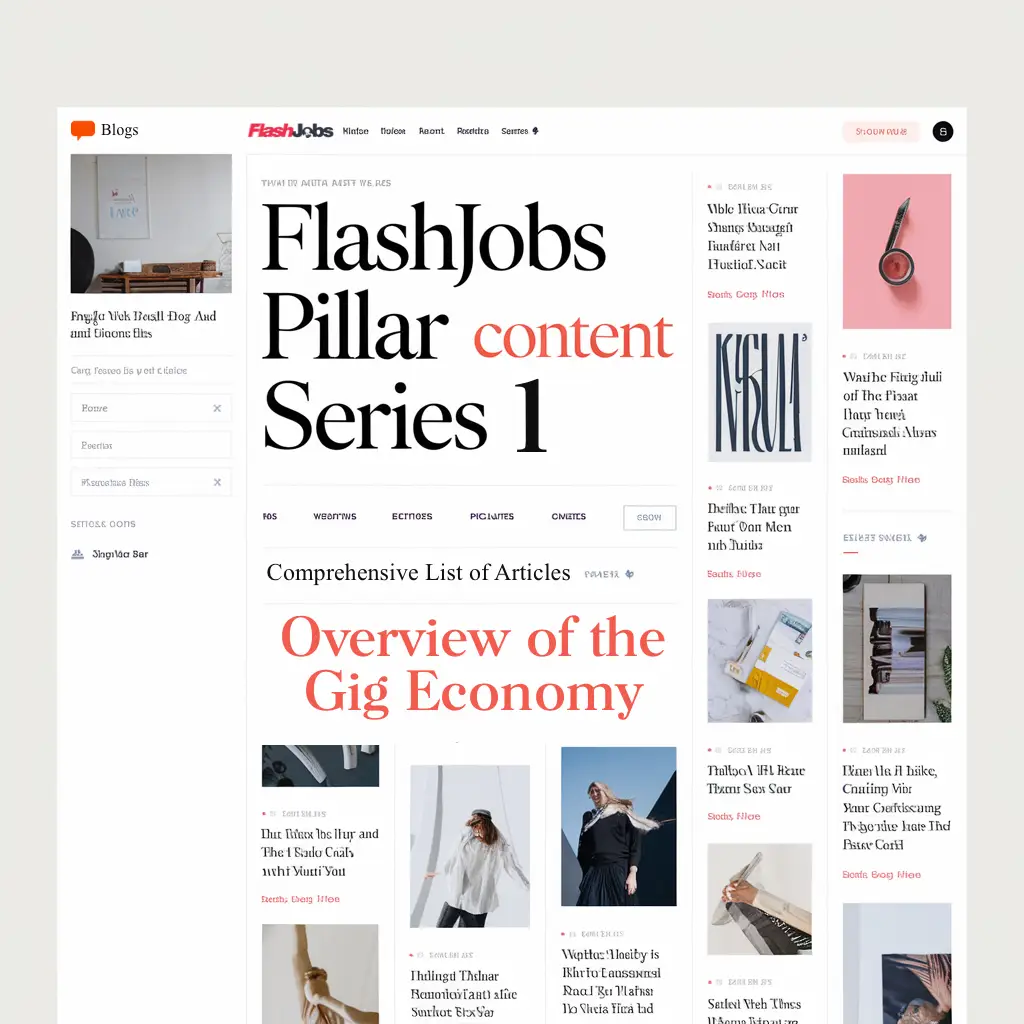Table of Contents
Did you know that 66% of online platform workers earn less than $3.4 USD per hour? This fact shows how urgent it is to protect gig workers. The gig economy is changing jobs fast, and regulators are trying to keep up.
The gig economy is growing fast and is expected to hit $455 billion in the U.S. by 2023. This growth has both benefits and disadvantages. While it offers flexibility, it often lacks basic protections. Sadly, only 40% of these workers have health insurance, and less than 15% are covered for work injuries.
The G20 countries have promised to protect all workers, including those in the gig economy. The E.U. has made a big move by strengthening gig workers’ rights. They aim to fix misclassification and improve working conditions.
As the gig economy grows, finding a balance between protecting workers and keeping platforms flexible is tough. Regulators face significant challenges like deciding on employment status, setting minimum wages, and giving workers benefits. They must keep the digital labour market’s innovative spirit alive. This article, Regulation: Enhancing Gig Work and Worker Protections in the Gig Economy, will highlight important regulations that gig workers need to be aware of.
Key Takeaways
- The majority of gig workers earn below-average wages.
- Health insurance and injury protection are lacking for most platform workers.
- G20 countries are committed to improving social protection for gig workers.
- E.U. has introduced new rules to enhance workers’ rights.
- Balancing worker protections and platform flexibility is crucial.
- Correct employment classification is key to ensuring adequate social protection.
Understanding the Gig Economy and Digital Labour Platforms
The way we work is changing fast, with the gig economy leading this change. This shift is thanks to digital platforms and the need for flexible work.
Defining the Gig Economy
The gig economy is all about short-term contracts and freelance work. It offers flexible jobs, often through digital platforms that link workers with customers. Gig workers are seen as independent contractors, working on short-term deals with companies.
South Africa’s platform economy is growing fast because of widespread internet use and a need for independent work. This growth is helping many jobless people find work in non-traditional jobs. Read our blog What Is Gig Work In The Gig Economy? to understand what gig work in the gig economy.
Digital Labour Platforms: The New Frontier of Work
Digital labour platforms are websites or apps that help with gig work. They offer many services, like ride-sharing, delivery, and online freelance tasks. The Online Labour Index tracks the number of people working online and the jobs they do.
- Over 40 million people in low- and middle-income countries work in the gig economy.
- Digital, like A.I. automation, is making the platform economy grow.
- Job matching in the gig economy helps both customers and businesses by making services better.
The gig economy has its ups and downs. It offers new chances for work but also raises worries about worker rights and the use of loopholes. As more people work on short-term contracts, policymakers and workers need to understand these changes.
The Current State of Gig Work Regulation
The gig economy has grown rapidly, with 22.1 million Americans now working as independent contractors. This growth has highlighted the need for better labour laws and started discussing how to classify workers.
Existing Employment Laws and Their Limitations
Current labor laws are having trouble classifying gig workers. This has led to some workers being wrongly labelled as independent contractors. In the construction field, up to 2.1 million workers might be in this wrong category.
This mistake can cause workers to lose a lot of money. Some might earn up to $16,729 less yearly than employees doing similar U.S.
The U.S. Department of Labor is developing a new rule to address this. This rule, set to start in March, could convert many gig workers into employees and give them benefits like overtime pay and unemployment insurance.
As a jobseeker exploring opportunities in the platform economy, it’s crucial to understand the evolving regulatory landscape that affects gig work. Local governments are increasingly developing policy documents to address the unique challenges and opportunities presented by platform work. These documents often aim to balance supporting innovation and protecting workers’ rights. As you consider gig work options, it’s worth researching the specific policies and provisions in your area, as they can significantly impact your working conditions, benefits, and overall job security.
At the same time, there’s a broader shift in the regulatory politics surrounding digital platforms towards stronger socioeconomic regulation. This trend reflects growing concerns about the power of large tech companies and their impact on workers and society. For you as a potential gig worker, this could mean increased protections and benefits in the future, as well as possible changes to the flexibility and autonomy that many find attractive in platform work. Keep an eye on developments in worker classification, benefits access, and collective bargaining rights for gig workers. Understanding these regulatory shifts can help you make informed decisions about your career path and advocate for your interests in the evolving gig economy landscape.
International Perspectives on Gig Economy Regulation
Countries around the world are taking different steps to regulate the gig economy. The E.U. is making new rules to fix worker classification issues and improve working conditions. Australia has also changed its Fair Work Act to regulate gig workers in the road transport sector.
| Region | Regulatory Approach | Focus Areas |
|---|---|---|
| United States | New Department of Labor rule | Worker reclassification, benefits |
| European Union (E.U.) | E.U. platform worker’s directive | Employment status, working conditions |
| Australia | Fair Work Act amendments | Transport industry gig workers |
As the gig economy grows, policymakers are trying to find a balance. They want to protect workers while keeping the flexibility that gig work offers. The goal is to make rules that protect workers without stopping innovation in this changing field.
Regulatory Focus: Worker Classification
The gig economy has sparked debates about worker classification and rights. As digital labour platforms grow, the line between employee-like workers and independent contractors blurs. This shift calls for new regulations to protect gig workers while maintaining flexibility.
Worker Classification and Rights
Worker classification impacts rights and benefits. The Bureau of Labor Statistics found that 79% of independent contractors prefer gig work to traditional jobs. However, this preference doesn’t negate the need for labour protection.
As a jobseeker, it’s important to understand how companies classify their workers and what it means for you. Companies are increasingly cautious about worker classification due to legal and financial risks. They must know local employment laws and carefully distinguish between contractors and employees based on work control, benefits, and relationship exclusivity. When you’re gig hunting, you might encounter more thorough hiring processes as companies strive to classify workers correctly.
For you, this awareness can be empowering, especially in navigating new forms of work arrangements. It would be best to understand the differences between an employee and a contractor, as it affects your rights, benefits, and tax obligations. If you’re offered a position, pay attention to how the company classifies you and ensure it aligns with the actual nature of your work. Remember, companies are advised to err on caution and classify workers as employees when in doubt. You might encounter Employer E.O.R.Record (E.O.R.) services managing your employment if you work internationally. Don’t hesitate to ask questions about your classification status during hiring. Being informed about these issues can help you advocate for yourself and ensure you’re treated fairly in your new role.
Understanding Your Classification
One of the most important aspects is how you might be classified when working for a platform. Traditionally, workers fall into two categories: employees or independent contractors. However, in the gig economy, things aren’t always so clear-cut. Many platform workers are classified as independent contractors, but this classification is increasingly being challenged in courts worldwide. Why does this matter to you? Your classification significantly impacts your rights and benefits. You’re typically entitled to minimum wage, overtime pay, and various protections as an employee. As an independent contractor, you might enjoy more flexibility but fewer guaranteed benefits.
Legal Developments to Watch
Courts are actively shaping the landscape of gig work. Notable cases, like those involving U.K. in the U.K., have resulted in rulings that classify some gig workers as employees, granting them additional rights. These decisions are often made case-by-case, considering factors like the level of control the platform exerts over workers. Interestingly, some countries are exploring new categories that fall between employee and contractor. France has introduced the “auto-entrepreneur” status, while Austria recognizes an “employee-like” category. These developments aim to provide a middle ground, offering some protections while maintaining flexibility.
Your Rights and Protections
As a potential gig worker, you should be aware of the ongoing efforts to extend protections to platform workers, regardless of their official classification. Some countries are implementing specific laws to regulate platform work conditions. For instance, Greece, France, and Estonia have introduced legislation addressing various aspects of gig work. One crucial area to consider is access to benefits. Depending on your classification and location, you might have different levels of access to social protections like health insurance, unemployment benefits, or pension contributions. It’s worth researching the specific regulations in your area.
Collective Action and Representation
Another important aspect is the ability to organize and bargain collectively. Traditional employment structures often have established channels for this, but gig workers face unique challenges. However, innovative approaches to worker representation are emerging in the platform economy. Staying informed about these developments can help you advocate for your rights more effectively.
Global Perspectives
If you’re considering gig work across borders, it’s essential to understand that approaches to platform work vary significantly between countries. What’s considered legal or standard practice in one country might not be the same in another. Some international organizations are working towards establishing guidelines, but it’s crucial to research the specific regulations in your target location. As you navigate the gig economy, remember that this field is rapidly evolving. Staying informed about legal developments, understanding your rights, and being aware of the ongoing debates around worker classification can help you make more informed decisions about your career in the platform economy.
Minimum Wage and Fair Compensation
Ensuring fair pay is crucial. Minneapolis recently set a $15.57 hourly minimum for ride-share drivers. Uber and Lyft announced service suspensions, highlighting the challenges of balancing worker rights with platform sustainability.
Benefits and Social Protection
Gig workers often lack social security and benefits. A new worker classification rule aims to address this gap. But it’s sparked lawsuits from business groups, showing the complexity of implementing change.
As a jobseeker considering work in the gig and platform economy, it’s crucial to understand the evolving landscape of social protection and security policies. Many platform workers face significant gaps in essential benefits like unemployment insurance, job retention schemes, sickness benefits, and health protection. This is often due to being classified as independent contractors rather than employees. However, there’s a growing recognition of the need to adapt national social protection policies and legal frameworks to include gig workers. Some countries are extending existing social protection systems to cover platform workers, while others are creating new schemes for the gig economy. These measures may include presumptions of employment status, mandatory contributions from platforms, and voluntary opt-in programs.
Knowing the key challenges and potential solutions in this area is important when exploring gig work opportunities. Correct classification of workers’ employment status, ensuring adequate financing and sustainability of protection schemes, and addressing the needs of workers with multiple platforms or employers are all critical issues. As a potential gig worker, you should look for platforms and countries working to improve access to social protections, regardless of employment status. Keep an eye out for policies that harness digital technologies to facilitate coverage and administration, as these may make accessing benefits easier. Also, consider the portability and transferability of benefits among schemes and employers, especially if you plan to work across multiple platforms or internationally. While the gig economy offers flexibility, it’s essential to prioritize your long-term security by understanding and advocating for improved social protections in this rapidly evolving sector.
Occupational Health and Safety
Safety is paramount in gig work. The diverse nature of gig jobs poses unique risks. Establishing managed care processes for gig workers differs from traditional employment, requiring innovative approaches to ensure worker well-being.
| Issue | Impact |
|---|---|
| Worker Misclassification | $462 million in underreported taxable wages |
| Unemployment Taxes | $152 million lost from 2013-2017 |
| Gig Worker Population | The gig economy involves 21-34 million people in the U.S.U.S., and regulations must adapt. Balancing worker protection with platform innovation remains a key challenge. Future policies must address minimum standards, social security, and labour protection while preserving the flexibility that attracts many to gig work. |
Regulatory Focus: Balancing Control and Independence in Gig Work
The gig economy has changed how we work, offering flexible schedules but testing old rules. It’s key to balance worker freedom and platform control as platforms use algorithms to manage work.
Platform Liability
Gig platforms are under more scrutiny about their duties to workers. With 34% of U.S. workers in the gig economy, they must handle complex legal issues. They must pay fairly and ensure safety while keeping the flexibility that draws people in.
As a jobseeker considering platform work, it’s crucial to understand the evolving landscape of platform liability and its implications for your rights and protections. Platform businesses are known for their organizational flexibility, often allowing them to operate in regulatory grey areas. However, there’s a growing push for these platforms to take on more legal responsibility for worker protection. This shift could significantly impact your experience as a gig worker. While platforms have traditionally maintained that they’re merely technology companies connecting independent contractors with customers, regulators and courts in various jurisdictions increasingly challenge this stance. They’re calling for platforms to assume more responsibility for worker welfare, including areas like minimum wage guarantees, health and safety protections, and benefits. As you explore gig work opportunities, it’s important to stay informed about these developments in platform liability. Look for platforms proactively addressing worker protections, which may offer more stability and security in the long run. Remember, the legal landscape is still evolving, and your rights and protections may vary depending on your location and the specific platform you work with.
Platform Algorithms and Worker Autonomy
Algorithmic management is key in many gig platforms and affects how workers are managed. New rules aim to make these systems more transparent. Workers now have the right to understand how algorithms affect their jobs and pay.
As a jobseeker considering platform work, it’s crucial to understand the concept of algorithmic management and its impact on your potential work life. Platforms often use complex algorithms to assign tasks, evaluate performance, and decide worker access and compensation. While these systems can increase efficiency, they raise concerns about transparency and fairness. Many workers and advocates are pushing for greater transparency in how these algorithms operate, arguing that workers have a right to understand the factors influencing their work assignments and earnings. As you explore gig work opportunities, look for transparent platforms about their algorithmic processes and provide clear explanations for decisions that affect your work. This transparency can help you better navigate the platform’s expectations and potentially improve your earnings and job satisfaction.
It’s also important to know the occupational risks associated with algorithmic management. These risks can include unpredictable scheduling, sudden changes in pay rates, or account deactivations without clear explanations. Some workers report feeling pressure to work long hours or accept less desirable tasks to maintain good standing with the algorithm. Additionally, the constant digital monitoring and performance tracking can lead to stress and burnout. As you consider platform work, consider how comfortable you are with this algorithmic oversight and management level. Look for platforms with safeguards to protect workers from unfair algorithmic decisions, such as appeal processes for account deactivations or mechanisms to challenge unfair ratings. Understanding these risks and how different platforms address them can help you decide which gig work opportunities align best with your needs and preferences.
Flexibility vs. Stability: Finding the Middle Ground
The gig economy offers great flexibility, with 42% of workers ready to leave jobs lacking remote options. But, this flexibility often means less job security. Regulators are trying to create rules that keep the good parts of flexible work while offering needed protections.
| Aspect | Traditional Employment | Gig Work |
|---|---|---|
| Minimum Wage | $ U.S./hour (U.S. fU.S.eral) | Not guaranteed |
| Benefits | Legally required | Not provided |
| Work Schedule | Fixed | Flexible |
| Equipment | Provided by employer | Worker’s responsibility |
As the gig economy grows, set to reach 43% of U.S.U.S.kers by 2023, finding this balance is vital. Regulators must make policies that protect workers without blocking the innovation and flexibility that make gig work appealing.
As a jobseeker considering platform work, you’re likely drawn to its flexibility. Choosing your hours and working on your own terms can be incredibly appealing. However, it’s important to understand that this flexibility often comes at the cost of stability. Platform firms wield significant power in shaping the work environment, and their practices can greatly impact your day-to-day experience. While you may have the freedom to log on and off at will, you might find yourself at the mercy of algorithmic decision-making, fluctuating pay rates, and a lack of traditional employment protections. As you explore gig work opportunities, consider how different platforms balance worker flexibility with stability measures, such as minimum earning guarantees or consistent work availability.
It’s also crucial to recognize that platform work often operates in a space that’s somewhat detached from broader social institutions. Traditional employment is typically coupled with various social protections like health insurance, retirement benefits, and unemployment insurance. Platform work, on the other hand, often exists in a more decoupled state. This means that as a gig worker, you might need to take on more personal responsibility for your financial and social security aspects. Some jurisdictions are working to reconceptualize this relationship, exploring ways to extend social protections to gig workers. As you consider your options, consider how you’ll manage these aspects of your work life. Look for platforms proactively addressing these issues, perhaps by offering portable benefits or partnering with organizations that provide support services for gig workers. Remember, while the flexibility of platform work can be liberating, it’s important to consider your long-term stability and how your work fits into the broader social and economic landscape.
Regulatory Focus: Compliance Strategies for Digital Labour Platforms
Digital labour platforms are facing new challenges in following the rules. As more people work on these platforms, platform owners need to protect workers and ensure fair treatment.
Best Practices for Platform Operators
Platform owners should be open and protect workers’ data. A good step is to have clear rules for removing workers from the platform. This keeps trust and fairness on the platform.
It’s also important to keep workers’ private information safe. This means not sharing things like their messages or personal beliefs. By focusing on protecting data, platforms can build trust with their workers.
As a jobseeker exploring opportunities in the platform economy, it’s crucial to understand the competitive landscape and market dynamics that shape this rapidly evolving sector. Digital labour platforms have created a new architecture for work, connecting you with potential clients or customers in ways that weren’t possible just a few years ago. However, this new structure comes with its own set of challenges and opportunities. Policy recommendations for these platforms often focus on ensuring fair competition, protecting workers’ rights, and promoting transparency. As you evaluate different platforms, look for those that adhere to best practices in these areas. Platforms that provide transparent terms of service, fair dispute resolution processes, and transparent pricing structures are more likely to offer a stable and rewarding work environment.
The healthy development of the platform economy is a crucial concern for policymakers, platform operators, and workers alike. This involves balancing fostering innovation and ensuring adequate protection for all participants. For you as a potential gig worker, this means staying informed about regulatory changes that could affect your rights and responsibilities. Look for platforms proactively addressing issues like worker classification, access to benefits, and skills development opportunities. Some platforms partner with educational institutions or offer training programs to help workers upskill and remain competitive. As you navigate this dynamic market, consider the immediate earning potential of different platforms and how they might support your long-term career growth and financial stability. Remember, a thriving platform economy should create value for all stakeholders, including you as a gig worker.
Technology-Driven Solutions for Regulatory Compliance
Technology is key to following the rules. Platforms can use automated systems to ensure workers get paid enough and use blockchain for clear and honest records.
| Compliance Area | Tech Solution |
|---|---|
| Wage Tracking | Automated payment systems |
| Data Protection | Encryption tools |
| Worker Classification | AI-powered assessment tools |
Platform owners can use these tech solutions to make following the rules easier. This not only meets legal requirements but also improves everyone’s experience on the platform.
As a jobseeker considering work in the platform economy, it’s crucial to understand the implications of data privacy and ownership in this digital landscape. Platforms you might work with collect vast amounts of data about your activities, performance, and even personal information. The regulation of this data is an evolving field, with policymakers working to create scalable regulatory frameworks that can keep pace with rapid technological advancements. These regulations aim to protect your rights as a worker while allowing platforms to innovate and operate efficiently. When evaluating potential gig work opportunities, look for transparent platforms about their data practices and comply with data protection regulations liC.C.P.ADPR or C.C.P.A. Consider how comfortable you are with the types and amount of data being collected about you and what control you have over this information.
Another important aspect to be aware of is large-scale off-platform data collection. Some platforms may gather information about you from sources beyond their app or website, potentially including your social media profiles, browsing history, or other online activities. This practice can significantly affect your privacy and potentially impact your work opportunities or reputation on the platform. As a jobseeker, it’s important to be proactive about your digital footprint and understand how it might affect your gig work prospects. Look for platforms that are clear about their data collection practices, including any off-platform sources they might use. Consider using privacy tools and being mindful of your online presence to maintain control over your personal information. Remember, in the digital economy, your data is a valuable asset – make sure you understand how it’s being used and protected as you navigate your gig work journey.
Regulatory Focus: Industry-Specific Considerations
The gig economy covers many sectors, each needing its own set of rules. These rules are key to tackling the unique problems workers and platforms face in different areas.
Ride-sharing and Delivery Services
Ride-sharing and food delivery have their own set of challenges. For example, Amazon’s gig drivers made $18 to $25 an hour but lost over $60 million in tips due to a Federal Trade Commission rule. This shows the need for better protection for workers in this field.
Freelance and Creative Industries
Freelancers in creative fields often work online, facing their own set of regulatory hurdles. With the gig economy expected to hit $455 billion by 2023, it’s crucial to have rules that protect freelancers and ensure they get paid fairly.
Care Work and Home Services
The care economy, including home services, needs special rules because of its personal nature and safety concerns. It’s important to balance protecting workers and keeping clients safe, especially in home settings.
| Industry | Key Regulatory Focus | Challenges |
|---|---|---|
| Ride-sharing/Delivery | Fair compensation, worker safety | Tip diversion, misclassification |
| Freelance/Creative | Intellectual property rights, fair contracts | Income instability, lack of benefits |
| Care Work/Home Services | Worker safety, client protection | Privacy concerns, liability issues |
As the gig economy grows, we need to keep updating our rules to protect workers and encourage innovation in all sectors.
Regulatory Focus: Financial Considerations
The gig economy has brought new financial challenges for workers and platforms. With the increase in the number of U.S. workers depending on it, there’s a big push for better taxation rules and ensuring everyone can access financial services.
Tax Implications for Gig Workers and Platforms
Gig workers have a tough time with taxes. They often get money from different places, making it hard to keep track of their earnings. Platforms might have to share worker data with tax officials to follow the rules. Some areas are looking at easier tax systems for gig workers to help them out.
As a jobseeker considering platform work, I find it crucial to understand the complex world of taxation in the gig economy. Digital platforms have been scrutinized for their tax practices, with some employing evasive strategies to minimize their tax obligations. These strategies include operating through tax havens, exploiting loopholes in international tax laws, or structuring their businesses to reduce taxable income. While these practices may not directly impact you as a worker, they can influence the overall stability and reputation of the platforms you might work for. It’s worth researching the tax practices of potential platforms to ensure you’re aligning yourself with companies that operate ethically and sustainably, avoiding any potential penalties.
On a more personal level, you need to be aware of the tax implications of being a platform worker. As an independent contractor or freelancer, you’ll likely be responsible for managing your taxes, which differs greatly from traditional employment. This includes understanding self-employment taxes, keeping track of your income and expenses, and potentially making quarterly estimated tax payments. You may also need to navigate deductions and credits specific to gig workers, which can help reduce your tax burden. Educating yourself on these responsibilities or seeking professional advice to ensure you comply with tax laws is important. While the flexibility of gig work is appealing, remember that it comes with the added responsibility of managing your finances and taxes. Being proactive about understanding and meeting your tax obligations can help you avoid surprises and maintain financial stability in your gig work career.
Access to Financial Services for Gig Workers
Many gig workers struggle to access financial services. Because their income isn’t steady, banks find it hard to determine whether they can lend to them. This makes getting loans, insurance, and other financial products tough for them.
To help, governments and banks are coming up with new ideas:
- Low-interest loans and microfinancing programs
- Specialized insurance products for gig workers
- Financial education initiatives
Some countries are finding new ways to help gig workers with social security. France has an “Auto-entrepreneur” status, and Singapore has a self-employment category. These help give workers more social support while still letting them work on their terms.
As the gig economy grows, finding the right balance is crucial. Regulators must work on taxes, ensuring everyone can access financial services and social security. This will help make the gig economy work for everyone.
The Path Forward: New Rules and Potential Impact
The gig economy is changing fast, and new rules are on the way. These changes will shape the future of work. Policymakers have a big role in protecting workers, and innovation can happen.
Proposed Regulations and Their Potential Effects
New rules aim to improve worker rights and classification. Starting March 11, 2024, the U.S. Department of Labor will use a six-factor criterion for classifying workers, which could greatly affect industries like transportation and logistics.
- Opportunity for profit or loss
- Investments by workers and potential employer
- Degree of permanence of work relationship
- Nature and degree of control
- Extent of work integral to employer’s business
- Skill and initiative required
The Role of Stakeholder Collaboration
Getting different groups to work together is key to good gig economy rules. Platforms, workers, unions, and policymakers need to team up. Together, they can devise solutions that protect workers and help the economy grow.
| Stakeholder | Role in Policy Development |
|---|---|
| Platforms | Invest in worker protections, engage in public policy discussions |
| Workers | Provide input on working conditions and needs |
| Unions | Advocate for worker rights and fair compensation |
| Policymakers | Create balanced regulations, consider all stakeholder perspectives |
Working together, we can make the gig economy work for everyone. This will help shape the future of work in a good way.
Conclusion Regulation: Enhancing Gig Work
The gig economy has changed how we work, offering both good and bad sides. As digital platforms grow, we see a big need for strong rules for the gig economy. Studies show that 72% of gig workers struggle with unstable income. This shows we must protect these workers fast.
Finding the right balance between flexible work and job security is key. Even though more people are joining gig work, only 36% benefit from employers. This shows that we need new rules to ensure that all workers are treated fairly.
Policymakers must tackle the big issues of the gig economy. Already, 18% of countries are making new rules for gig workers. By focusing on how workers are classified, paying them fairly, and giving them benefits, we can improve the digital platform economy for everyone.
Source Links
- https://www.ilo.org/media/366091/download – PDF
- https://www.park.edu/blog/the-gig-economy-shaping-the-future-of-work-and-business/ – The Gig Economy: Shaping the Future of Work and Business | Park University
- https://www.socsci.ox.ac.uk/improving-working-conditions-for-workers-in-the-digital-gig-economy – Improving working conditions for workers in the gig economy
- https://ecsecc.org/datarepository/documents/ec-gig-economy_QR3HX.E.C.S.E.C.C.ECSECC
- https://www.atingi.org/gigeconomy/policy-maker/ – The Rise & Economics of the Gig Economy – Policy Maker
- https://www.investopedia.com/new-worker-classification-rule-could-disrupt-the-us-gig-economy-8546526 – New Worker Classification Rule Could DisrupU.S.U.S.S.U.S. Economy
- https://laborcenter.berkeley.edu/pdf/2017/What-Do-We-Know-About-Gig-Work-in-California.pdf – What Do We Know About Gig Work in California? An Analysis of Independent Contracting
- https://reason.org/commentary/federal-independent-contractor-regulation-threatens-the-gig-economy/ – Federal independent contractor regulation threatens the gig economy – Reason Foundation
- https://healthesystems.com/rxi-articles/classification-complications-will-gig-workers-enter-the-workers-comp-market/ – Classification Complications: Will Gig Workers Enter the Workers’ Comp Market? – Health systems
- https://www.pymnts.com/gig-economy/2024/side-hustles-in-focus-as-gig-worker-laws-stir-uncertainty/ – Side Hustles in Focus as Gig Worker Laws Stir Uncertainty
- https://bbi.syr.edu/wp-content/uploads/application/pdf/bio/harpur-blanck-2020-gig-disabilities.pdf – Gig Workers with Disabilities: Opportunities, Challenges, and Regulatory Response
- https://www.ncbi.nlm.nih.gov/pmc/articles/PMC9107384/ – When gig workers become essential: Leveraging customer moral self-awareness beyond COVID-19
- https://www.linkedin.com/pulse/gig-economy-future-work-challenges-opportunities-santosh-g-vxwyc – The Gig Economy and the Future of Work: Challenges and Opportunities
- https://www.ilo.org/media/407896/download – PDF
- https://www.ncbi.nlm.nih.gov/pmc/articles/PMC9141816/ – Taming Proteus: Challenges for Risk Regulation of Powerful Digital Labor Platforms
- https://ecipe.org/publications/regulating-the-working-conditions-of-platform-work/ – What Can We Learn from E.U. ME.U.ber States? |
- https://futurework.org.au/wp-content/uploads/sites/2/2017/08/Gig_Symposium_PrePub_Stewart_Stanford.pdf – PDF
- https://harvardlawreview.org/print/vol-136/consumer-protection-for-gig-work/ – Consumer Protection for Gig Work? – Harvard Law Review
- https://www.bbc.com/worklife/article/20220308-why-gig-work-is-so-hard-to-regulate – Why gig work is so hard to regulate
- https://whiteshield.com/insights/the-gig-economy-a-new-challenge-for-policy-makers/ – The Gig Economy: A new challenge for policymakers – Whiteshield
- https://fiscalnote.com/blog/gig-economy-policy-changes-implications – Redefining the Gig Economy: Policy Changes and Implications for the…
- https://parivedasolutions.com/perspectives/the-gig-economy-a-fractured-and-failing-promise/ – The gig economy: a fractured and failing promise – Pariveda
- https://www.hklaw.com/en/insights/publications/2024/01/new-rule-on-independent-contractor-classification – New Rule on Independent Contractor Classification Will Have Profound Impact on Businesses | Insights | Holland & Knight
- https://www.cambridge.org/core/journals/the-economic-and-labour-relations-review/article/regulating-work-in-the-gig-economy-what-are-the-options/247BA28AFB1E727EC28EFCC283757742 – Regulating work in the gig economy: What are the options? | The Economic and Labour Relations Review | Cambridge Core
- https://medium.com/@harishraj1296/the-gig-economy-and-labour-laws-navigating-new-challenges-5627865a2921 – The Gig Economy and Labour Laws: Navigating New Challenges
- https://irle.berkeley.edu/wp-content/uploads/2017/09/Labor-Platforms-and-Gig-Work.pdf – Labor Platforms and Gig Work: The Failure to Regulate






